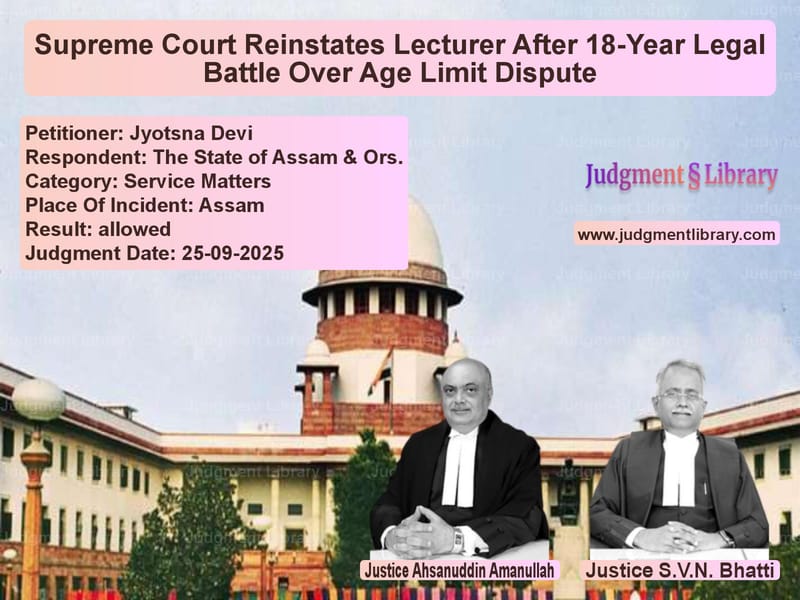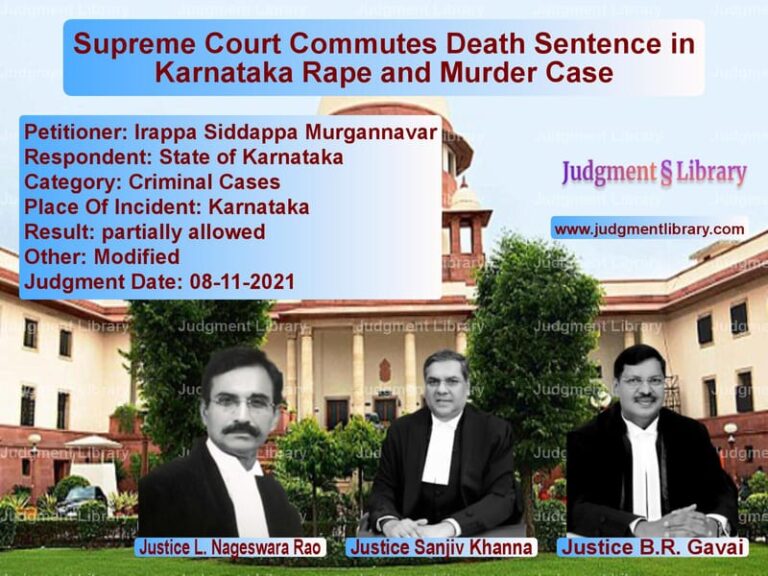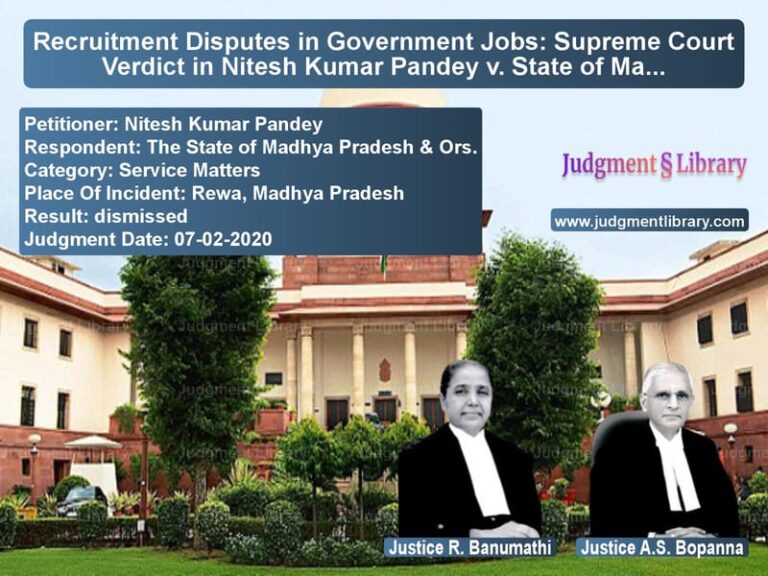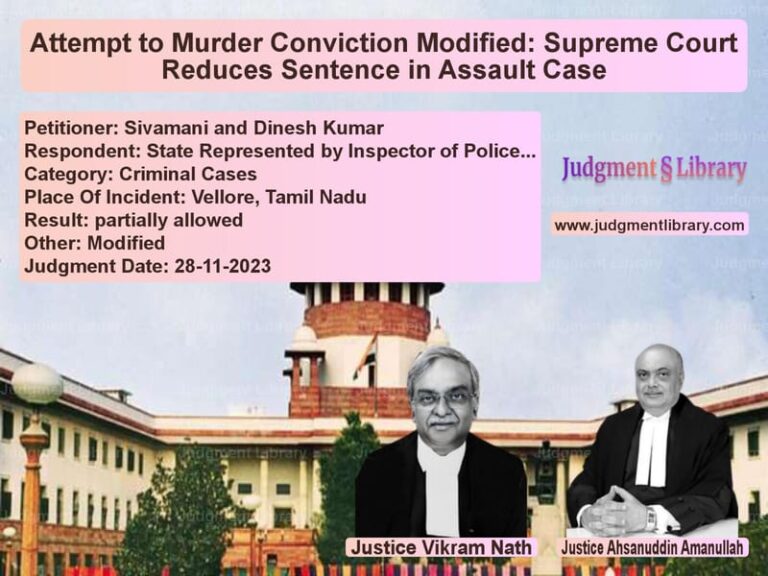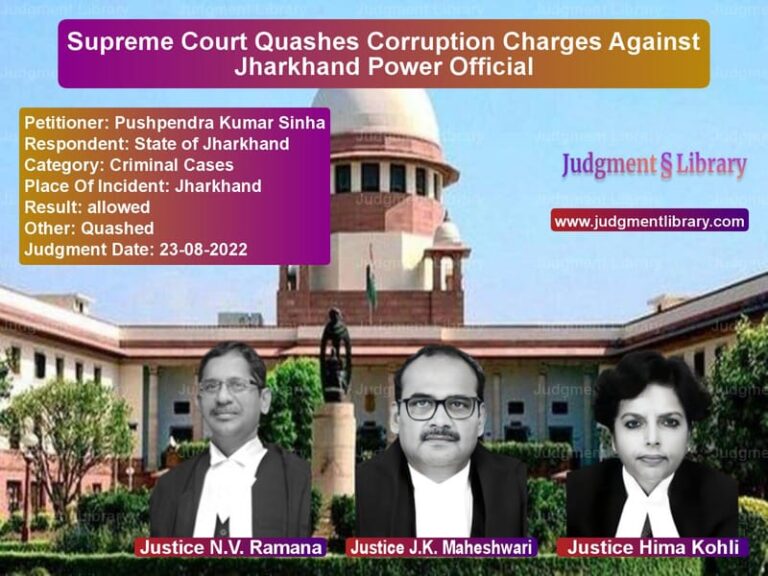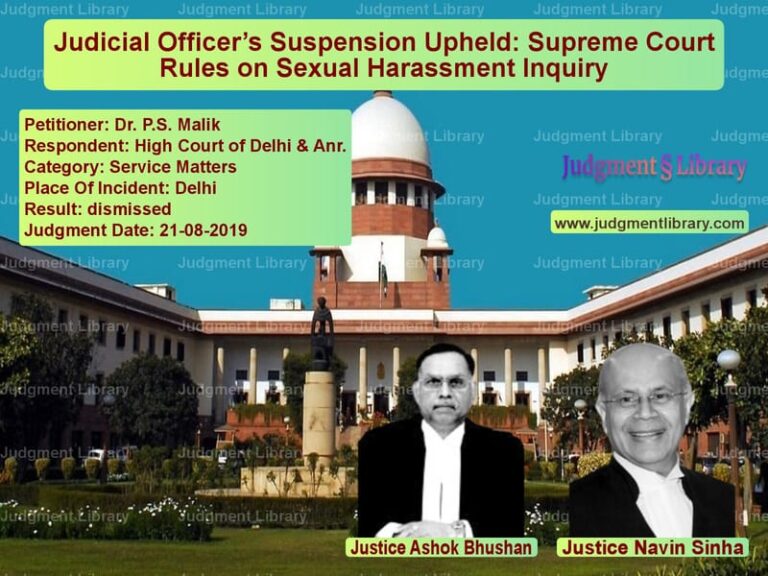Supreme Court Reinstates Lecturer After 18-Year Legal Battle Over Age Limit Dispute
In a significant judgment that highlights the importance of applying the correct rules to recruitment processes, the Supreme Court of India has reinstated a lecturer who had been removed from service after nearly two decades of legal battles. The case involved Jyotsna Devi, who was appointed as a Lecturer in History in 2006 but faced termination due to a dispute over which recruitment rules applied to her appointment in an aided college in Assam.
The Beginning of the Legal Journey
The story began on February 28, 2006, when Respondent No. 3 college issued an advertisement to fill a vacant post of Lecturer in History. Both the appellant Jyotsna Devi and Respondent No. 5 participated in the selection process. The Governing Body of the college, after noticing the relatively better merit and suitability of Jyotsna Devi, resolved to select her on July 24, 2006. The same day, the Governing Body forwarded the resolution to the State Government for approval.
It’s important to note that the college was an aided institution at the time of the selection process, and the advertisement was issued with reference to the Assam Government Aided Junior College Management Rules, 2001 (2001 Rules). Crucially, the advertisement did not stipulate any upper or lower age limit as a qualification or disqualification for applying to the post.
The Age Condonation and Approval
The State Government, on October 13, 2006, exercised its discretion and communicated to the college, condoning the alleged overage of 2 years and 7 months of Jyotsna Devi. Subsequently, on March 22, 2007, the Director of Higher Education approved her appointment as Lecturer. Jyotsna Devi then entered service as Lecturer in History in the college and continued to serve for what would eventually become 18 years of continuous service.
The Legal Challenge Begins
Respondent No. 5, who had also participated in the selection process, filed Writ Petition No. 1707 of 2007 challenging the order condoning Jyotsna Devi’s overage and the order approving her appointment. The core argument of Respondent No. 5 was that Jyotsna Devi was aged 39 years at the time of advertisement or during appointment to the post of Lecturer. While the advertisement was issued referring to the 2001 Rules, Respondent No. 5 argued that the Assam Secondary Education (Provincialisation) Service Rules, 2003 (2003 Rules) should apply, which prescribed an age limit between twenty-one to thirty-six years for candidates being recruited.
The Single Judge’s Decision
The Learned Single Judge dismissed the writ petition on March 30, 2010, with some crucial findings that would later become significant in the Supreme Court’s decision. The Single Judge noted: “As could be gathered from the affidavits filed by the respondents, the respondent No.5 was appointed under the provisions of the Assam Govt. Aided Junior College Management Rules, 2001. Apparently, it is not clear whether 2001 Rules have been framed either under the 1984 Act or under 1977 Act. Be that as it may, 2001 Rules have been framed especially for governing the management and control of colleges, imparting education in plus two stage. Hence, it has to be inferred that selection of respondent no.5 is governed by these Rules.”
The Single Judge further elaborated: “It is true that Repeal and Savings provision under Rule 32 in 2003 Rules it has been clarified that all Rules, corresponding to these Rules in force immediately before commencement of these Rules shall stand repealed. However, the Rules are applicable only for Provincialisation Act, 1977 and not for 1984 Act. In my considered, opinion, both 1977 Act and 1984 Act operate in different fields. The basic object to enact the 1977 Act is for Provincialisation of secondary education, whereas, 1984 Act has been enacted to regulate, supervise and develop the higher secondary education in the State of Assam. Hence, I am of the considered opinion that conditions incorporated in 2003 Rules, with regard to appointment and service conditions of persons appointed in Higher Secondary Schools cannot be made applicable to the staff appointed by the Governing Bodies of Junior Colleges. Even otherwise, the admitted position is that the respondent No.5 has been appointed adhering to the provisions of Gout Aided Junior College Rules, 2001 and not 2003 Rules.”
The Division Bench’s Reversal
Respondent No. 5 then filed Writ Appeal No. 262 of 2011 before the Division Bench, which allowed the appeal on February 24, 2012. The Division Bench took a different view, noting that while the 2001 Rules did not provide for any age limit, Rule 19(iv) of the 2003 Rules had to be applied. The Division Bench recorded: “Judged by the parameters as above, It is apparent that both on the date of the advertisement as well as on the last date for submission of applications by the willing candidates, the respondent No.5 was beyond the age of 37 years prescribed for entry into Government service. In the teeth of Rule 19(iv) of the Rules, in our estimate, she was over aged at all relevant times and, thus, was not eligible to participate in the selection process. As admittedly the condonation of her overage was much subsequent to the completion of the selection process, the same could not have legalised her candidature with retrospective effect.”
The Supreme Court Proceedings
Jyotsna Devi challenged the Division Bench’s order before the Supreme Court in SLP No. 16230 of 2012. On August 28, 2017, the Supreme Court granted liberty to file a review petition while dismissing the SLP. This led to the filing of Review Petition No. 175 of 2017 before the High Court, which was dismissed, bringing the matter back to the Supreme Court through the present civil appeals.
Arguments Before the Supreme Court
Mr. Rituraj Biswas, arguing for the appellant, made several crucial points. He argued that “the impugned orders are entirely silent on the applicability of the Rule to the subject selection by an aided institution. Respondent No. 3 was provincialised subsequently in point of time, and the advertisement was issued before provincialization. Applying the 2001 Rules for the subject selection would be proper and legal. The Appellant participated in the selection process with reference to the 2001 Rules. The Appellant is the meritorious candidate, and the step taken in abundant caution should not be put against the Appellant.”
He further contended that “applying Rules made under Article 309 of the Constitution of India to an aided post in the absence of applicable Rules amounts to an illegal exercise of jurisdiction by the High Court.”
Mr. Chinmoy Pradip Sharma, Senior Additional Advocate General appearing for Respondent Nos. 1 and 2, did not dispute the appointment of Respondent No. 5 and her continuation in service, as well as the subsequent provincialisation of the college. However, he argued that “the appellant has rendered service for a considerable time, and the appointment may be confirmed without laying down the principle applicable on the method and mode of recruitment in aided colleges.”
The Supreme Court’s Analysis and Decision
The Supreme Court, after appreciating the undisputed circumstances, expressed its clear view on the issue. The Court noted: “The advertisement is clear that the selection process is set in motion as per the 2001 Rules. The Appellant stood at serial no. 1 in the merit list. The Governing Body resolved the appellant’s case for approval and appointment. The Government, referring to the extant Rules, condoned the overage for applying to an aided post in an aided institution.”
The Court made a significant observation: “In the absence of the advertisement or the spelling out of applicable Rules, applying Rule 19(iv) of the 2003 Rules, to set aside the approval and appointment of the appellant, in the circumstances of this case, is illegal.”
Consequently, the Supreme Court set aside the orders dated February 24, 2012 and May 24, 2023, and expressed agreement with the view taken by the Learned Single Judge.
The Final Relief and Directions
The Supreme Court provided a balanced solution to the complex situation. Regarding Respondent No. 5, who was admittedly working as a Lecturer under the administrative control of Respondent Nos. 1 and 2, the Court made it clear that “the services of the Respondent No. 5 shall not be interfered with, notwithstanding the view taken by us in this order.”
For Jyotsna Devi, who had been discontinued after the dismissal of the review petition, the Court directed: “Respondent Nos. 1 to 4 to reinstate the Appellant within 4 weeks from today, and the respondents shall not treat the break in service between the date of termination and reinstatement pursuant to this order. The appellant shall be given continuity of services for all purposes, without any back wages.”
Significance of the Judgment
This judgment is significant for several reasons. First, it emphasizes the importance of applying the correct set of rules to recruitment processes, particularly distinguishing between aided institutions and government colleges. Second, it recognizes the principle that candidates should be judged based on the rules that were applicable at the time of advertisement and selection process, not rules that might become applicable later.
The judgment also demonstrates the Court’s practical approach to resolving long-standing service disputes, balancing the rights of both the original appointee and the subsequently appointed candidate. By protecting the service of Respondent No. 5 while reinstating Jyotsna Devi with continuity of service, the Court ensured that both individuals who had dedicated years to teaching would not suffer unduly due to legal technicalities.
This case serves as an important precedent for similar disputes where the applicability of different sets of recruitment rules is in question, particularly in the education sector where institutions often transition from private aided status to government control.
Petitioner Name: Jyotsna Devi.Respondent Name: The State of Assam & Ors..Judgment By: Justice Ahsanuddin Amanullah, Justice S.V.N. Bhatti.Place Of Incident: Assam.Judgment Date: 25-09-2025.Result: allowed.
Don’t miss out on the full details! Download the complete judgment in PDF format below and gain valuable insights instantly!
Download Judgment: jyotsna-devi-vs-the-state-of-assam-&-supreme-court-of-india-judgment-dated-25-09-2025.pdf
Directly Download Judgment: Directly download this Judgment
See all petitions in Employment Disputes
See all petitions in Recruitment Policies
See all petitions in Public Sector Employees
See all petitions in Education Related Cases
See all petitions in Judgment by Ahsanuddin Amanullah
See all petitions in Judgment by S.V.N. Bhatti
See all petitions in allowed
See all petitions in supreme court of India judgments September 2025
See all petitions in 2025 judgments
See all posts in Service Matters Category
See all allowed petitions in Service Matters Category
See all Dismissed petitions in Service Matters Category
See all partially allowed petitions in Service Matters Category

